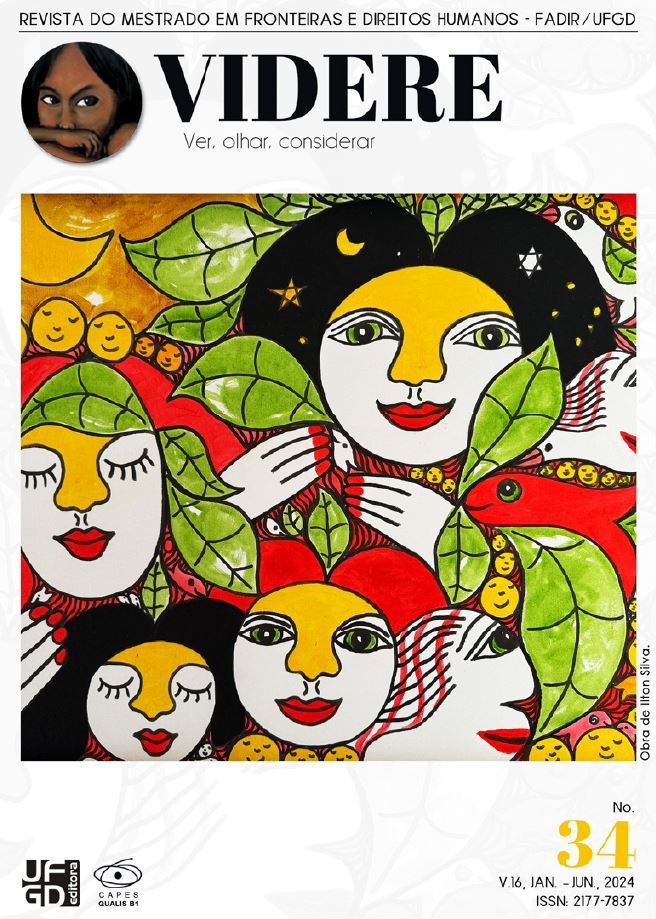Globalization and sustainable development: a return to Milton Santos’ fable
DOI:
https://doi.org/10.30612/videre.v16i34.16879Keywords:
Sustainable Development Goals, Globalization, International Law, International Society, Third World Approaches to International Law, DiscourseAbstract
The SDG (Sustainable Development Goals) were crated following the same logic of the Millenium Development Goals, but changing its emphasis and adding more substance to its core concepts. Unfortunately, current ways of production and the complexity of international society, along with the evolution of the idea of globalization combine to suggest that some of these objectives are presented in an contradictory way, and lack both a more incisive approach in order to be enforceable, while also ignore methods of production and state dependance of market structures. With this in mind, this work will address the idea of globalization in Milton Santos’ “Toward an Other Globalization”, while presenting the main discourse which is addressed in the Sustainable Development Goals.
Downloads
References
ALAMI, Ilias; COPLEY, Jack; MORAITIS, Alexis. The ‘wicked trinity’ of late capitalism: governing in an era of stagnation, surplus humanity, and environmental breakdown. Geoforum, [S.L.], p. 103691, fev. 2023. Elsevier BV. http://dx.doi.org/10.1016/j.geoforum.2023.103691.
ANGHIE, Antony. Colonialism in Nineteen Century International Law. Imperialism, Sovereignty And The Making Of International Law, [s.l.], p.196-244, ago. 2005. Cambridge University Press.
CUMMINGS, Sarah; REGEER, Barbara; HAAN, Leah de; ZWEEKHORST, Marjolein; BUNDERS, Joske. Critical discourse analysis of perspectives on knowledge and the knowledge society within the Sustainable Development Goals.
Development Policy Review, [S.L.], v. 36, n. 6, p. 727-742, 29 ago. 2017. Wiley. http://dx.doi.org/10.1111/dpr.12296.
GALINDO, George Rodrigo Bandeira. A volta do terceiro mundo ao direito internacional. Boletim da Sociedade Brasileira de Direito Internacional, v. 119-24, p. 46-68, 2013.
HICKEL, Jason. The contradiction of the sustainable development goals: growth versus ecology on a finite planet. Sustainable Development, [S.L.], v. 27, n. 5, p. 873-884, 15 abr. 2019. Wiley. http://dx.doi.org/10.1002/sd.1947.
KLABBERS, Jan. Beyond Functionalism: International Organizations Law in Context. In: The Cambridge Companion to International Organizations Law. KLABBERS, Jan. Cambridge University Press. 2022.
KOSKENNIEMI, Martti. Empire and International Law: The Real Spanish Contribution. University of Toronto Law Journal, [s.l.], v. 61, n. 1, p.1-36, jan. 2011. University of Toronto Press Inc. (UTPress).
MCARTHUR, John W. The origins of the millennium development goals. The SAIS Review of International Affairs, v. 34, n. 2, p. 5-24, 2014.
UNITED NATIONS. Declaração e Programa de Ação de Viena. World Conference on Human Rights, 1993, Available: <http://www.oas.org/dil/port/1993%20Declara%C3%A7%C3%A3o%20e%20Programa%20de%20Ac%C3%A7%C3%A3o%20adoptado%20pela%20Confer%C3%AAncia%20Mundial%20de%20Viena%20sobre%20Direitos%20Humanos%20em%20junho%20de%201993.pdf>. Accessed 12 jan 2014.
UNITED NATIONS. United Nations Development Program (UNDP) The Millenium Development Goals Report 2013, disponível em <http://www.undp.org/content/dam/undp/library/MDG/english/mdg-report-2013-english.pdf> Acesso em 15 jan 2014.
UNITED NATIONS. United Nations Development Program (UNDP) The Millenium Development Goals Report 2013, disponível em: <http://www.undp.org/content/dam/undp/library/MDG/english/mdg-report-2013-english.pdf> Acesso em 15 jan 2014. p. 3.
UNITED NATIONS. The Future We Want. June 22, 2012. Available at: <https://sustainabledevelopment.un.org/content/documents/733FutureWeWant.pdf>. Accessed 10 jan 2020.
UNITED NATIONS. Transformando o Nosso Mundo: A Agenda 2030 para o Desenvolvimento Sustentável. September 25, 2015. Available at: <https://nacoesunidas.org/wp-content/uploads/2015/10/agenda2030-pt-br.pdf >. Accessed 10 jan. 2020.
OUR WORLD IN DATA. Energy use per person, 2021. Available at: < https://ourworldindata.org/energy>. Accessed 12 mar 2023.
POGGE, Thomas; SENGUPTA, Mitu. Assessing the sustainable development goals from a human rights perspective. Journal Of International And Comparative Social Policy, [s.l.], v. 32, n. 2, p.83-97, 3 maio 2016. Cambridge University Press (CUP). http://dx.doi.org/10.1080/21699763.2016.1198268.
SANTOS, Milton. O retorno do território. In: Território, Globalização e Fragmentação. SANTOS, Milton; DE SOUZA, Maria Adélia A.; SILVEIRA, Maria Laura. 4ª Edição. São Paulo, Editora Hucitec, 1998.
SANTOS, Milton. Por uma outra globalização – Do pensamento único à consciência universal. 6ª Edição. Rio de Janeiro, Editora Record, 2001.
SEN, Amartya. Development As Freedom. Nova Iorque: Alfred A. Knopf, 2000. 366 p.
SENGUPTA, Arjun K. The Right to Development: Report of the Independent Expert on the Right to Development, Dr. Arjun Sengupta, pursuant to General Assembly resolution 54/175 and Commission on Human Rights resolution E/CN.4/RES/2000/5. 2000. Disponível em: <http://www.unhchr.ch/Huridocda/Huridoca.nsf/0/4490c26031920601c12569610048a2a0/$FILE/G0015327.pdf>. Accessed 15 jan. 2014.
UNITED NATIONS. Report of the Secretary General: Road map towards the implementation of the United Nations Millennium Declaration. September, 2001. Available at: <https://digitallibrary.un.org/record/448375>. Accessed 10 mar 2023.
VARELLA, Marcelo. Internacionalização do Direito: Direito Internacional, globalização e complexidade. 2013. Centro Universitário de Brasília, Brasília. Available at: <https://papers.ssrn.com/sol3/papers.cfm?abstract_id=2263949>. Accessed 10 mar 2022.
Downloads
Published
How to Cite
Issue
Section
License

This work is licensed under a Creative Commons Attribution-NonCommercial-ShareAlike 3.0 Unported License.
Authors must accept the publication rules when submitting the journal, as well as agree to the following terms:
(a) The Editorial Board reserves the right to make changes to the Portuguese language in the originals to maintain the cultured standard of the language, while respecting the style of the authors.
(b) Authors retain the copyright and grant the journal the right to first publication, with the work simultaneously licensed under the Attribution-NonCommercial-ShareAlike 3.0 Brazil (CC BY-NC-SA 3.0 BR) that allows: Share - copy and redistribute the material in any medium or format and Adapt - remix, transform, and create from the material. CC BY-NC-SA 3.0 BR considers the following terms:
- Attribution - You must give the appropriate credit, provide a link to the license and indicate whether changes have been made. You must do so under any reasonable circumstances, but in no way that would suggest that the licensor supports you or your use.
- NonCommercial - You may not use the material for commercial purposes.
- Sharing - If you remix, transform, or create from material, you must distribute your contributions under the same license as the original.
- No additional restrictions - You may not apply legal terms or technological measures that legally restrict others from doing anything that the license permits.
(c) After publication, authors are allowed and encouraged to publish and distribute their work online - in institutional repositories, personal page, social network or other scientific dissemination sites, as long as the publication is not for commercial purposes.



















